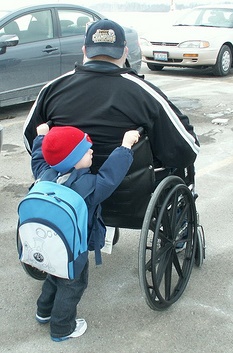This blog is written by Lee Gale Gruen to help Baby Boomers, seniors, and those soon to retire find joy, excitement, and satisfaction in life after retirement. Her public lecture on this subject is titled, “Reinventing Yourself in Your Retirement.” Her memoir, available by clicking here Amazon.com, is: Adventures with Dad: A Father and Daughter’s Journey Through a Senior Acting Class. Click here for her website: http://AdventuresWithDadTheBook.com
Now, on to my blog:
 Some of us go willingly into the role of caretaker, and some of us are thrust into it without being consulted. Examples of voluntary caretaker roles are: parent, teacher, nurse, and even pet owner. (Yes, owners of sick pets have been found to have more than normal stress, anxiety, and depression.)
Some of us go willingly into the role of caretaker, and some of us are thrust into it without being consulted. Examples of voluntary caretaker roles are: parent, teacher, nurse, and even pet owner. (Yes, owners of sick pets have been found to have more than normal stress, anxiety, and depression.)
Some people deliberately choose caretaking involvements and thrive on them. But, what about when the role of consuming, full-time or almost full-time caretaker ensnares us when we hadn’t planned on it, hadn’t desired it, and it does not fit our personality type?
A typical scenario might be when an ailing spouse requires ongoing, long-term care. There may be no one else available to step into the caretaker role other than the remaining, healthy spouse. Other examples might be when children have to care for an aging parent or when parents have to care for a child who has become permanently disabled. We’re not talking here about just bringing them lunch in bed. We’re talking about hands-on care of their bodily needs and functions, entertaining them, transporting them, and maybe even supporting them financially.
You might be a caretaker from afar. Maybe you are responsible for someone in a placement of some sort or who resides a long distance from you. Perhaps you’re the go-to-person for any problems, crises, concerns, questions or decisions. Although your life is not necessarily hampered on a continual basis, that responsibility is always capable of demanding instant attention from you or superseding anything else you had planned. You live with an underlying tension, never knowing when your remote caretaker duties will kick in.
You may feel overwhelmed and no longer able to cope with that role no matter how much you are concerned about your charge? You might find yourself becoming resentful, angry, bitter, impatient, irritable, and stressed out. This can lead to negative behaviors toward your dependent such as yelling, ignoring, pushing, or worse. After that, you may feel guilty as he/she did not choose to require caretaking and is helpless to help you. Cyclical emotions such as these can spiral you into depression which renders you less capable of being an effective caretaker.
To the outside world, sympathy and attention usually goes to the sickly or helpless one. People rarely have much left for the caretakers or even think of them as needing any. Yet caretakers burn out. Caretakers may become sick themselves simply from the job of caretaking.
So what can you do to break this cycle and stay relevant and capable in your role as a caretaker? How can you take care of yourself, not only for you but for your charge? Both you and they need you to remain strong emotionally and physically.
You can seek respite from time to time. Find outside activities that bring you pleasure and enjoyment. Take breaks from the caretaking business just as anyone with a job has weekends or other days off as well as periodic, longer vacations. In short, refresh yourself on a regular basis.
To do this, you need someone or several someones to step in as a substitute caretaker while you’re gone. Start seeking suitable candidates. These might be your children; other family members; friends; neighbors; members of your church, temple, or mosque; hired help; volunteers from an organization; home-health aides referred by an insurance plan or a governmental agency, etc. You must do this for yourself, even if you feel that no one else can take care of your ward as well as you can.
By taking better care of yourself, you are indirectly taking better care of the one who is dependent on you. You return to duty refreshed, in a better mental state, and with a better outlook knowing that your next break will come soon.
***
Please forward my blog to anyone who might be interested and post it on your Facebook, Twitter and other social media. To reprint any material, contact me for permission at: gowergulch@yahoo.com. If you want to be automatically notified when I post a new blog, click on the “Follow” button in the upper right corner of this page and fill in the information. To read my other blog posts, scroll down on this page or click on “Recent Posts” or “Archives” under the Follow button. To opt out of receiving this blog, contact me at the aforementioned email address, let me know, and I’ll remove you from the list.
Photo credit (modified by user): Cindy Funk via Visualhunt / CC BY
This may be your best or maybe most important of all! Good thinking and writing. Saw Nancy, Lois and Joyce this week. Maxine has invited a group to meet for lunch on Sat., but I can’t go. Scary stuff happening in wine country. We have friends who were evacuated at 4 am in their pajamas. Haven’t heard if their Sr. residence burned or not. Have fun. Love, Sheila
Sent from my iPhone
>
That’s one of the things I miss about not living in Los Angeles anymore. I don’t get to come to those events where I can connect with old friends and acquaintances. There are always trade-offs.
Good article, as usual. I was taken by your inclusion of pets. Having nursed a believed sick dog for 4 years, I know the stress and worry. So long as he seemed happy despite having diabetes and Cushings, I could not let him go. Some people said, “It’s only a dog–why spend all that money and restrict your own life choices?” H’mmm, I guess they never knew the loving soul of a dog. Sometimes I think we humans don’t deserve them.
I adore dogs, and remember that final, one-way trip to the vet. It’s devastating.
True, LGG, If you don’t take care of yourself you might not have enough left to take care of anyone else.
Yeah, and people forget that.
Great read and I could relate. The longer I do this I realize it can be a gift if you let it be. I have read all ot your past blogs and you have a talent for writing and blogs feel real.
Stan Pletz
I’m so glad you enjoy my blogs, Stan. I love writing them and getting feedback from people who read them.